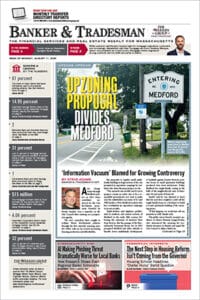
The next big thing in housing affordability isn’t coming from Gov. Maura Healey or a leading legislator. Instead, a housing scholar is taking matters into his own hands. iStock illustration
Forget the happy talk from state and some local leaders about all the wonderful progress being made in the battle to rein in the Bay State’s long-standing housing crisis.
We are treated to suspiciously rosy housing production numbers and press releases touting growing local compliance with the MBTA Communities Act.
The 2021 law requires Boston-area cities and towns to create multifamily zoning districts, and only a relatively modest number of communities have indeed rebelled outright.
However, a significantly larger group is likely engaging in paper compliance aimed at staying within the law, but preventing, as much as possible, any new apartment and condo construction.
There is growing recognition among developers and some housing advocates as well that the MBTA housing law, while helpful, won’t come anywhere near solving our housing production issues.
In fact, housing insiders have been closely watching for signs over the past year or two that the Legislature or the governor might propose an additional and more sweeping round of zoning reform this year, to no avail. Instead she seems to be putting her weight for this legislative session behind housing permitting reforms tucked into an environmental bill.
Well, a potential next step has arrived, but it’s coming not from a key state lawmaker or the governor, but from a proposed statewide ballot question put forth by a young housing researcher named Andrew Mikula.
How It Would Work
A senior fellow at the Pioneer Institute, Mikula wants to enlist the help of Massachusetts voters in reviving middle-class affordability by tearing down NIMBY regs that killed the old-fashioned starter home
For decades now, most suburbs and towns across the region have mandated minimum lot sizes of an acre or more, all but guaranteeing McMansions with price tags of well over $1 million.
The compact subdivisions of Capes, ranches and colonials of the 1950s and 1960s – much less townhouses – couldn’t get built today in Greater Boston.
However, that could change under a proposed statewide ballot question housing researcher Andrew Mikula filed last week with the state attorney general’s office.
At Pioneer, Mikula has done stellar reports digging into the housing crisis in Massachusetts and the exodus of young professionals to other states. (It’s worth noting that Mikula is undertaking this initiative as a private citizen, and not as part of his role at Pioneer.)
Now Mikula is putting some of that research into practice with a proposal that would prevent local cities and towns from enforcing lot sizes larger than 5,000 square feet in residential districts with access to public sewer and water.
Frontage requirements would be limited to 50 feet.
By comparison, there are more than 43,000 square feet in an acre, which is often the smallest lot on which a home can be built in many communities across Eastern Massachusetts.
Homes for New Families and Downsizers
The proposal comes with the state in need of well more than 200,000 new single-family houses, condominiums and apartments in the coming years.
By freeing up the construction of homes on modestly-sized lots, builders will be able to meet pent-up market demand for more affordable starter homes for young families and for seniors looking to downsize, which, in turn, could free up larger, single-family homes for sale.
“The urgent and extreme nature of Massachusetts’ housing shortage, coupled with public polling data and existing legal precedents, underscores that now is the opportune time to pursue this initiative petition,” Mikula said in a press release.
“I envision nothing less than a far-reaching expansion of opportunity for a new generation of homeowners to thrive in Massachusetts,” he added.
Now comes the hard part. In order for the proposal to actually get on the ballot and go before voters across Massachusetts, Mikula and other supporters will have to gather at least 75,000 signatures by late November.
The ballot question will also have to pass legal muster with the attorney general’s office.

Scott Van Voorhis
Don’t Write It Off
Still, while it might be tempting to dismiss Mikula and his proposed ballot question as a long shot, that would be a mistake.
Mikula cites recent polling data that he believes shows strong support for allowing more homes to be built on smaller lots.
He also has the support of some key people involved in the effort to boost housing production in Massachusetts, including Abundant Homes MA head Jesse Kanson-Benanav, noted Harvard economist and housing scholar Ed Glaeser and Greg Reibman, president and CEO of the Charles River Chamber, per CommonWealth Beacon.
It’s also not hard to imagine the real estate industry – and in particular developers and homebuilders – also rallying to the cause.
Unlike so many housing initiatives over the years in Massachusetts that have failed to live up to their promise, this has the potential to be a true game-changer.
Scott Van Voorhis is Banker & Tradesman’s columnist and publisher of the Contrarian Boston newsletter; opinions expressed are his own. He may be reached at sbvanvoorhis@hotmail.com.





